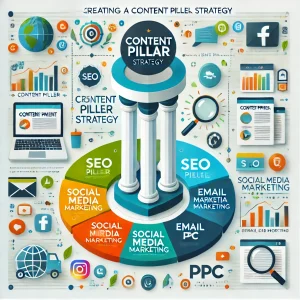Module: Introduction to Digital Marketing
Prepared by: Hermanto
Introduction
Digital marketing is one of the essential skills in today’s digital era. This module is designed to provide a foundational understanding of digital marketing concepts, strategies, and tools.
Learning Objectives
By the end of this module, participants will be able to:
- Understand the basic concepts of digital marketing.
- Identify various digital marketing channels.
- Learn how digital marketing strategies work.
- Use basic digital marketing tools effectively.
Table of Contents
- Introduction to Digital Marketing
- Definition and Benefits
- Digital Marketing vs. Traditional Marketing
- Core Components of Digital Marketing
- Search Engine Optimization (SEO)
- Search Engine Marketing (SEM)
- Social Media Marketing (SMM)
- Content Marketing
- Email Marketing
- Analytics
- Digital Marketing Strategies
- Identifying Target Audience
- Creating Buyer Personas
- Developing a Marketing Funnel
- Digital Marketing Tools
- Google Analytics
- Canva
- Hootsuite
- SEMrush
- Practical Exercises and Case Studies
- Simulated Campaign Creation
- Analyzing Successful Campaigns
- Assessment and Evaluation
- Quiz
- Final Project: Creating a Digital Marketing Plan
Detailed Content
1. Introduction to Digital Marketing
Definition:
Digital marketing refers to promoting products or services using digital channels such as the internet, social media, search engines, email, and websites.
Benefits:
- Global reach.
- Increased brand awareness.
- Cost-effective compared to traditional marketing.
2. Core Components of Digital Marketing
SEO (Search Engine Optimization):
The process of optimizing content to appear on the first page of search engines.
SMM (Social Media Marketing):
Leveraging social media platforms to engage audiences and promote products.
3. Digital Marketing Strategies
Buyer Persona:
A fictional representation of an ideal customer based on market research.
- Example:
Name: John
Age: 28
Occupation: Small business owner
4. Digital Marketing Tools
- Google Analytics: Tracks website visitor data.
- Canva: Creates visually appealing content.
- Hootsuite: Schedules social media posts.
Learning Methods
- Theory: Explanation of basic concepts and materials.
- Practice: Hands-on exercises using tools.
- Discussion: Case studies and experience sharing.
Final Assessment
Final Project: Create a simple digital marketing strategy based on a real-world case.
Project Format:
- Define the target audience.
- Select digital marketing channels.
- Plan content strategies and schedules.
References
- Chaffey, D., & Ellis-Chadwick, F. (2019). Digital Marketing: Strategy, Implementation, and Practice.
- Neil Patel Blog: www.neilpatel.com
- HubSpot Resources: www.hubspot.com
This module aims to serve as a foundation for understanding and applying digital marketing strategies effectively.


Leave a Reply